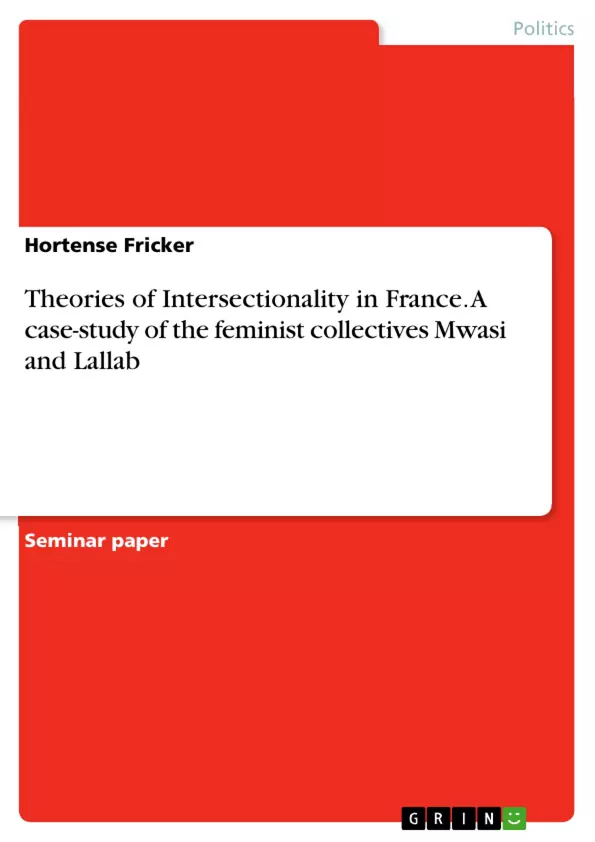The question that this paper will aim to answer is: how can the cases of the Mwasi and Lallab collectives, and their perception in France, be analyzed through the lens of the theory of intersectionality? This theory seems particularly fit for this research paper, as its arrival in French academia has challenged the more traditional universal feminism in a lot of different ways in the last fifteen years. Moreover, both collectives define themselves as intersectional feminist groups and advocate for taking into account the particular experiences of women.
The first part of this paper details the development of the theory of intersectionality in the United States, before looking at the particular case of France and studying some of the reasons that have made its acceptance difficult. The second part focuses on the Mwasi collective, detailing its mission and actions before going over its perception in France, in particular with the case of the Nyansapo festival organized in 2017. Similarly, the third part focuses on the Lallab collective and the controversies it has had to face for its support of the choice of women to wear a hijab. Finally, for the conclusion, parallels are drawn between the two cases, in order to determine what it shows of the perception of the theory of intersectionality in France.
Inhaltsverzeichnis (Table of Contents)
- Introduction
- Theories of intersectionality in France
- Mwasi collective
- Lallab collective
- Conclusion
Zielsetzung und Themenschwerpunkte (Objectives and Key Themes)
This research paper aims to examine the concept of intersectionality in France through the lens of two feminist collectives, Mwasi and Lallab. The paper explores how these collectives and their public reception demonstrate the tensions between universal and intersectional feminisms in French society.
- The development and reception of intersectionality in France
- The role of race, ethnicity, and colonialism in French society
- The experiences and perspectives of Afro-feminist and Muslim feminist groups
- The impact of intersectional feminism on activism and social movements
- The challenges and opportunities presented by intersectionality for feminist theory and practice in France
Zusammenfassung der Kapitel (Chapter Summaries)
The first part of the paper will trace the development of intersectionality in the United States, highlighting its origins in Black feminism and its subsequent uptake in academic circles. The paper will then analyze the specific context of intersectionality in France, examining the historical and political factors that have shaped its reception and its ongoing challenges.
The second part will focus on the Mwasi collective, detailing its mission and activities, including its role in organizing the Nyansapo festival in 2017. This section will also explore how Mwasi has been perceived within French society, highlighting any controversies or debates related to their work.
The third part will similarly focus on the Lallab collective, examining its advocacy for Muslim women's rights, particularly their support for the choice to wear a hijab. This section will analyze the controversies surrounding Lallab's work and its significance within the broader context of intersectional feminism in France.
Schlüsselwörter (Keywords)
Key terms and concepts explored in this paper include intersectionality, universalism, Afro-feminism, Muslim feminism, race, ethnicity, colonialism, activism, social movements, feminist theory, and French society.
Frequently Asked Questions
What is the main focus of the research on intersectionality in France?
The paper analyzes how the collectives Mwasi and Lallab reflect the tensions between traditional French universal feminism and the newer theory of intersectionality.
What is the Mwasi collective?
Mwasi is an Afro-feminist collective in France that advocates for the specific experiences of Black women. It gained significant attention during the Nyansapo festival in 2017.
What challenges does the Lallab collective face?
Lallab, a Muslim feminist group, faces controversy in France for supporting women's choice to wear the hijab, which challenges French secular and universalist norms.
Why is intersectionality controversial in French academia?
Intersectionality challenges the traditional "universalist" model of French feminism by insisting on the importance of race, religion, and colonial history in shaping women's experiences.
Where did the theory of intersectionality originate?
The theory originated in the United States, rooted in Black feminism, before being adapted and debated in the French context over the last fifteen years.
- Quote paper
- Hortense Fricker (Author), 2019, Theories of Intersectionality in France. A case-study of the feminist collectives Mwasi and Lallab, Munich, GRIN Verlag, https://www.grin.com/document/964986



